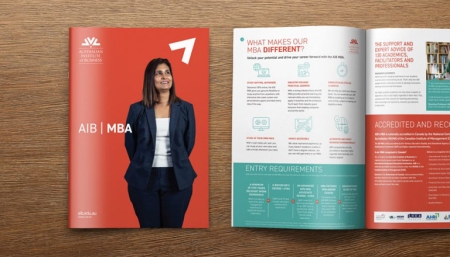Your work experience will supercharge your MBA

When toying with the idea of studying an MBA, mature professionals who haven’t studied in some time can find themselves approaching it with some hesitation. Although it can be a big step out of their comfort zone, those who have been in the workforce for many years and have a distinct advantage they may fail to realise – they have a wealth of practical experience to apply to their leaning, the great value of which they will understand once they begin their MBA.
When embarking on the Australian Institute of Business’ (AIB) MBA, a student’s work experience will be the most valuable credential they possess. As the practical business school, AIB has always championed a practical approach to learning, using a unique blend of theory and practice to ensure students achieve real career outcomes. This is aided by the use of everyday business case studies and applicable assessments which bring the concepts of the MBA to life.
Here’s why work experience is so crucial for getting the most from your MBA journey and how to best maximise it for study success and return on investment.
Realising the value of work experience
At many progressive business schools, including AIB, practical work experience is a prerequisite for entry into the MBA programme. Why? Because an understanding of the key business units, how they operate, and how they contribute to business success is required for the MBA to build upon.
The MBA is a Master’s degree, that which is more academically rigorous than a Bachelor degree and Honours, so students can expect the learning to be of a more advanced level. While a previous degree is not essential for entry into AIB’s MBA programme, practical experience is, because business schools recognise its value and relevance to the MBA course theory.
Your management experience can qualify you for the AIB MBA, no prior degree required. Learn more.
The more exposure to business practices and issues an MBA student has, the more insights and experiences they’ll have to apply their learning to. The ability to link a concept to a real-world experience or issue the student has faced will help to make the MBA theory relatable, importantly aiding comprehension, assimilation and recall. This will ensure the MBA learnings will benefit the student for the length of their career.
Synergies between work experience and MBA study
1. Apply what you’re learning at work
The best way to learn and retain a new concept is to apply it in the workplace. If you’re not sure how to proceed with this, take guidance from the learning materials which will connect theories and concepts with modern business examples.
But what if the subject has nothing to do with your day to day job or past roles? Seek out the department heads in your company or connections in your network that work in the discipline and discuss the concepts with them. They can assist by providing examples of the theory in practice and posing further questions to help get you in the right headspace for the subject.
If you’re specialising your MBA and studying a number of subjects in a particular discipline, let your HR department know. They may be able to assist by facilitating ongoing learning opportunities in the area, teeing up a mentor or offering a secondment.
2. Base your assessments on your professional experiences and workplaces
Throughout every MBA, students undertake a variety of assessments to demonstrate their understanding of the MBA’s concepts. Studying with AIB, the practical learning approach provides students with the opportunity to apply the theories they learn to real-world business problem, past professional experiences or an organisations they’re familiar with. When completing assessments, this sees students work with real problems to produce real solutions – a body of work that is also very useful outside of the degree.
The capstone subject of the AIB MBA – Project – in particular champions this approach. Students regularly report that their final project has real impact in their workplace, with their research, findings and recommendations driving organisational change.
Already with years of practical work experience under their belt, students who can associate their assignments to scenarios that resonate with them will enjoy additional learning outcomes.
Rodney Attrill, General Manager of Banking at Compare The Market, shared with us how his final project is being implemented at work when we caught up with him on graduation day.
3. Form study groups to learn from the diverse experiences of your fellow students
Students who study in a group gain a much deeper understanding of the material and its application in the real world. Studying on your own, you’ll definitely benefit from your work experience, as we’ve already discussed. So, imagine the power of that times three or four – the number of people in your study group. Even studying in a pair with a study buddy will double the knowledge and experience base you can leverage. Aim for diversity within your study group, as this will favourably bring alternative views, career experiences, industry perspectives and cultural understandings, enhancing the overall learning experience.
Every position you’ve held, leader you’ve worked with, company you’ve worked for and industry you’ve worked in have formed your practical career experiences and will prove invaluable throughout the MBA. Utilise them throughout your study journey to get the most out of the MBA and supercharge your learning.





